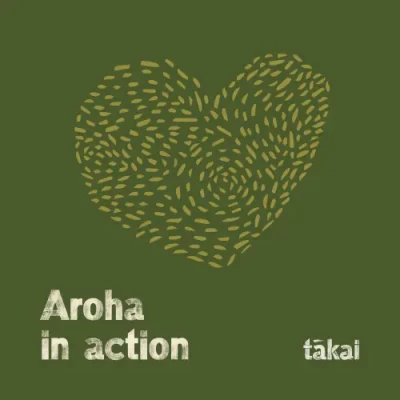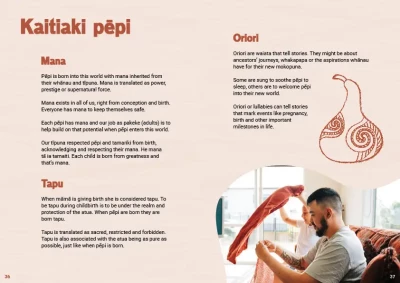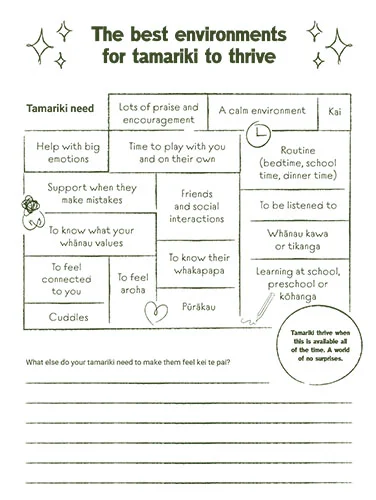
Mana of tamariki
Mana exists in all of us, including pēpi and tamariki. Mokopuna need adults who acknowledge them as having their own mana and who make their wellbeing a priority.
Mana can mean prestige, influence and power. The page on mana in Āhuru Mōwai begins by telling us that mana derives from the sacred power of the gods. It is passed down to tamariki from tīpuna and places them within the cosmic order. Everyone had a responsibility to ensure the mana of the whānau was safe and stayed intact for succeeding generations.
Forms of mana
Mana exists in three forms.
- Mana can be inherited through our whakapapa.
- Mana can be given by others in recognition of good deeds or humility.
- A group can achieve mana. Being acknowledged for how well they’ve treated manuhiri will lift the mana of a group.
While mana can be enhanced through an individual’s own actions, it can also be lost, resulting in negative consequences for the entire whānau, hapū and iwi.
In modern times, mana as a term has evolved and transformed to its current meaning of authority and rights, but the authority achieved by a person with mana, is still likened to that of the most supreme status.
Tūpuna Parenting: Mana and tapu
Tūpuna Parenting: Mana and Tapu (transcript)
Liz Harte and Hana Tuwhare appear on screen together, seated opposite one another surrounded by native bush. The following text appears on screen beneath them: Liz Harte - Ngati Porou, Ngāpuhi- Pēpi Penapena AND Hana Tuwhare - Ngāpuhi - Talking Matters.
Liz: So our tūpuna, our ancestors from pre-colonial times, they parented quite differently to some whānau today. There are two pou, two pillars of tūpuna Māori parenting. Firstly, pēpi are born with mana.
Hana: What does mana mean to you?
Liz: I mean, the dictionary says it’s a spiritual power, it’s authority, its prestige. But , you know, for my whānau it’s that potential greatness of pēpi. It’s the potential they have to grow into a productive person in future. The mana comes from the atua, spirit world, and from their tūpuna, from their ancestors. It’s inherited and we all have it. Our tūpuna believe this and they treated pēpi with respect. So we know how we show respect to other adults. We hold open a door for them or give a kuia or a koro a chair. With pēpi we don’t really talk about that a lot. We can do that with pēpi. We can kōrero with our pēpi, we can interact with our pēpi just as we do with adults. Absolutely, aē. The second pou of tūpuna parenting is pēpi are born tapu, born sacred. Tapu is a tricky thing, but because pēpi are from the atua,that means that they’re protected, untouchable, protected by the gods.
Hana: So what did that mean for our pēpi?
Liz: Well, for pēpi and tamariki, it meant that our tūpuna didn’t smack them or insult them in any way.
Hana: Do you reckon our tūpuna used to kōrero more with our pēpi to enhance the mana of our pēpi?
Liz: Āe, absolutely. I remember the story you shared about the bean bags…
Hana: Yes…
Liz: During the lockdown my son opened up the bean bag and got the beans all over the living room floor. Huge mess! But I took a big breath and I kept my cool.
Hana: Āe, I’m sure even though it would have been hard.
Liz: Āe, I explained to him that he wasn’t allowed to go outside and play opn his bike with his sister unitil we had cleared up every last bean. We got there in the end and I helped him and I was talking to him the whole time.
Hana: Beautiful, that was an opportunity for you to reclaim some tūpuna parenting. You got down to his level, you introduced some new language, some new concepts and you problem solved together as a team.
Liz: It’s really kind of simple everyday example of tūpuna parenting.
Hana:So next time I get hōha with my nephews and nieces and I’ve got some time…
Liz:Āe, channel your tūpuna. Keep your cool and have a kōrero.
Hana: It’s really the best thing.
Liz:E pai ana
(Fades to white background with and the words ‘TALKING TO PĒPI RECOGNISES THEIR MANA AND THEIR TAPU NATURE’ appear in the middle of the screen above logos for: Talking Matters and Pēpi Penapena)
Respecting mana
Situations where someone is being verbally harassed or abused can cause stress or anxiety for anyone involved, including bystanders, particularly if they’re young children.
When adults lose their cool, yell, shout, or hit children, they are trampling on that child’s mana. Young minds can find such events doubly confusing and stressful as they try to make sense of what is happening, especially if it involves people they love.
Helping whānau to consider how they feel as adults when their mana is not respected and they are treated in this way, might get them thinking about the damage that can be done to young children through unsafe or disrespectful environments.
Conversation ideas
Rebuilding mana
Any parent who loses their cool and verbally or physically lashes out towards their partner, tamariki or other whānau members often feels ‘stink’ about their behaviour afterward. They can feel like their own mana has been diminished through their lack of personal control.
Feeling remorseful and admitting our behaviour was wrong are the first steps in the process of rebuilding our sense of mana and the mana of the others concerned. Rebuilding our relationships, especially with our tamariki, is so important. Not only does it lessen their anxiety, it also models how things can get better after hurtful or challenging events happen.
Conversation ideas
Conscious parenting
As whānau supporters, we have a role to help whānau understand that their behaviour may be diminishing the mana of their tamaiti.
Talk with whānau about using positive discipline not physical punishment. The simplest tikanga we can have for our whānau is ‘no hitting’. This helps maintain the mana and tapu of all whānau members and reduces the risk of anyone getting hurt.
Other resources you could use are:
 pdf 5 MB
pdf 5 MB













